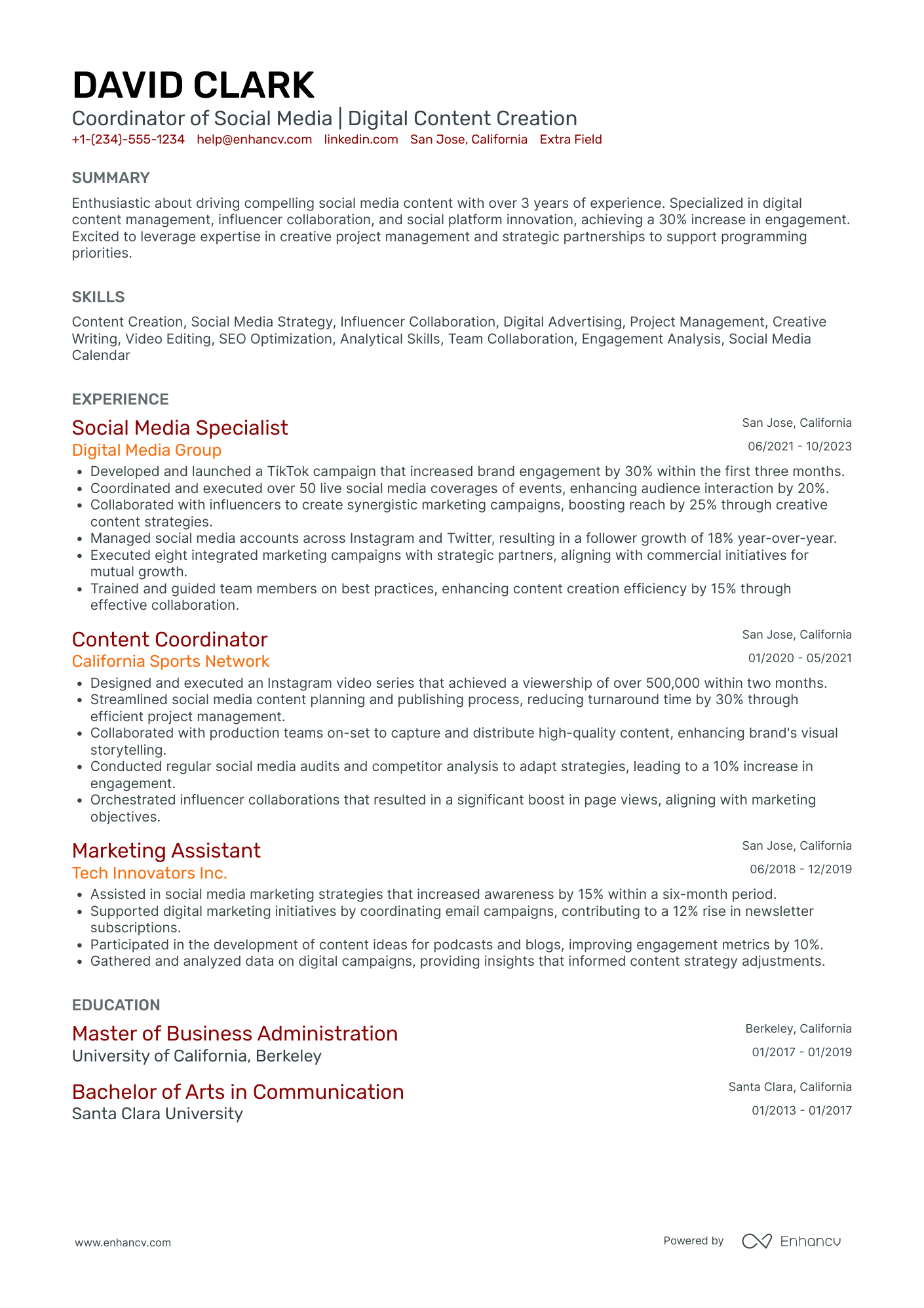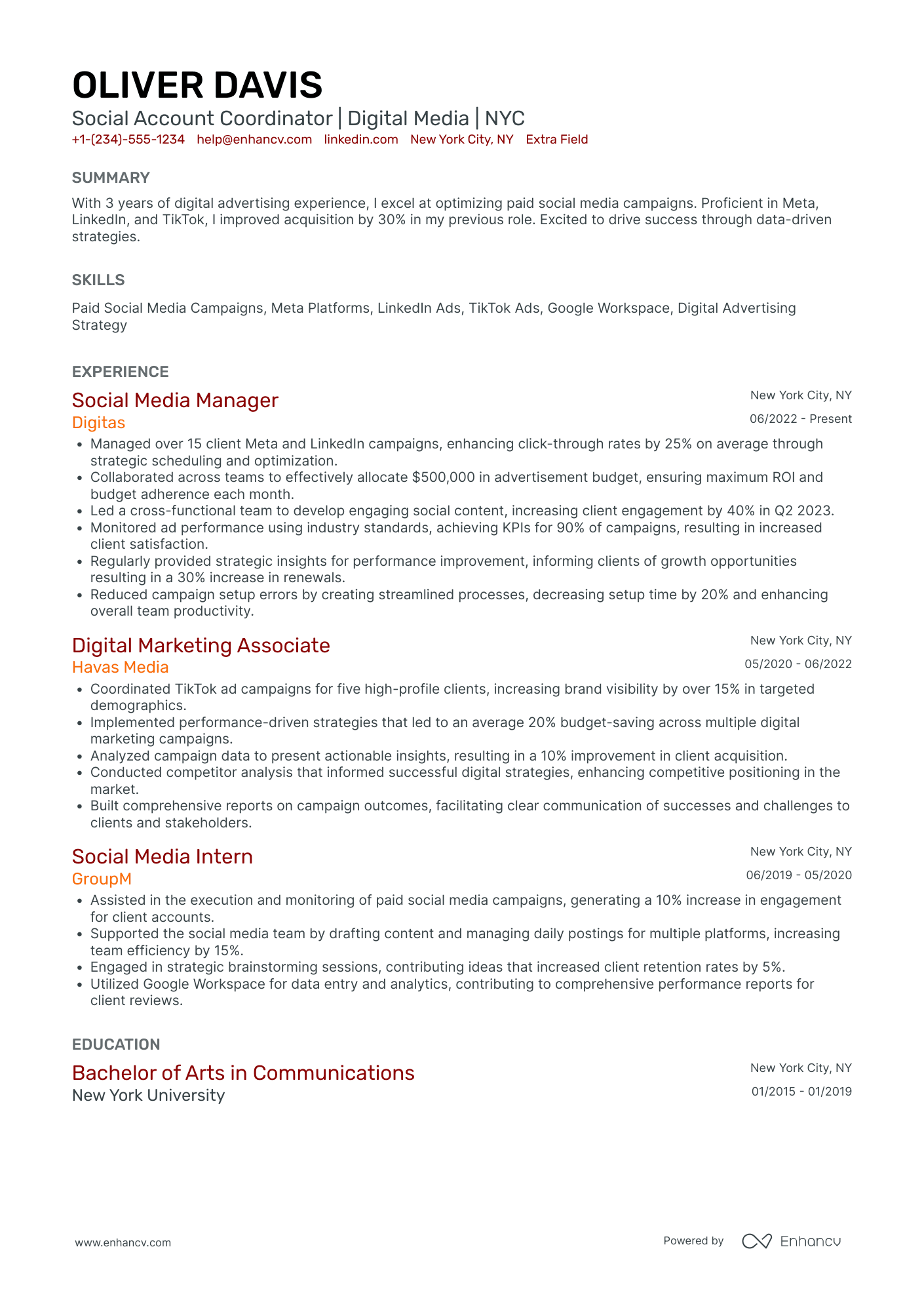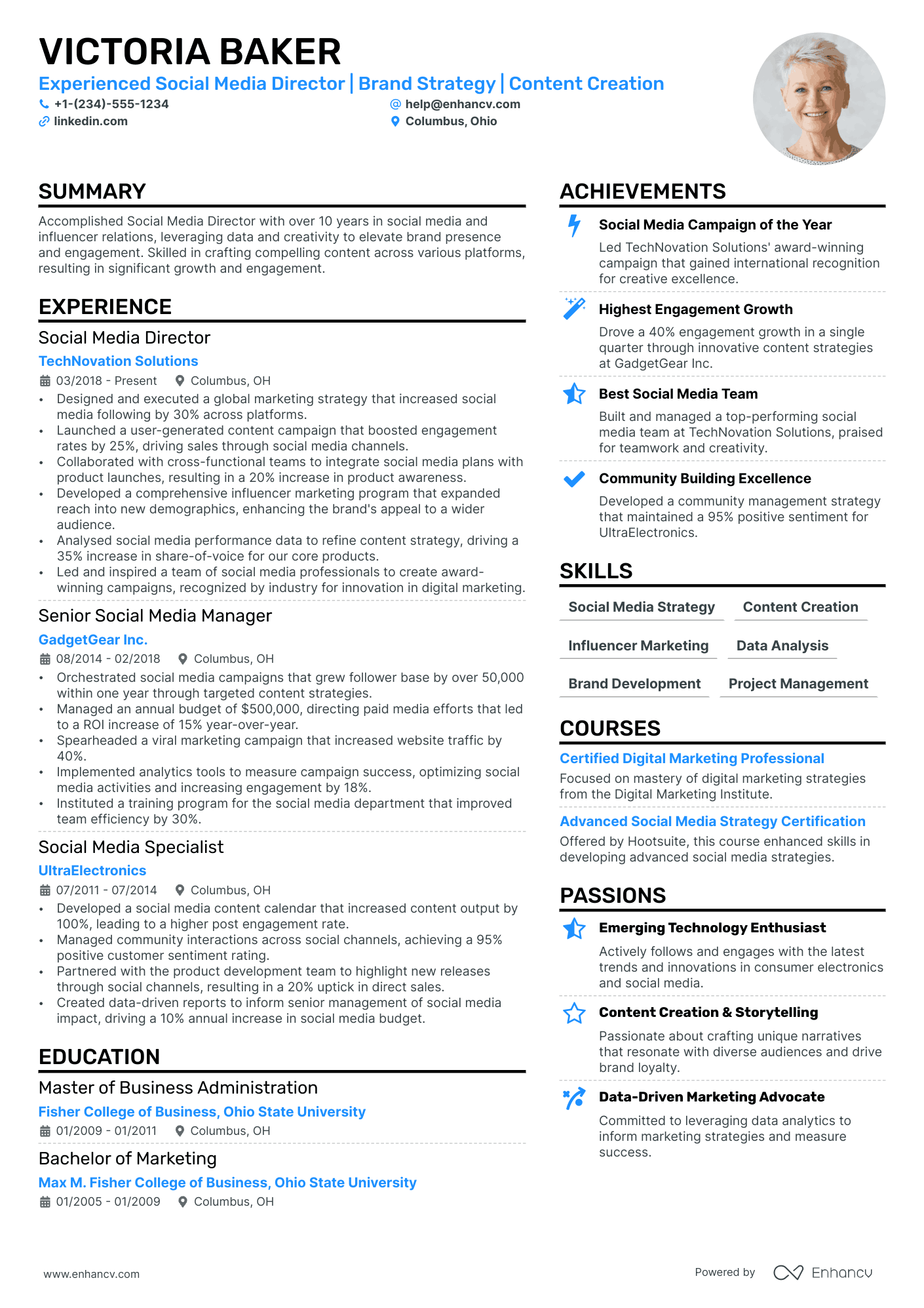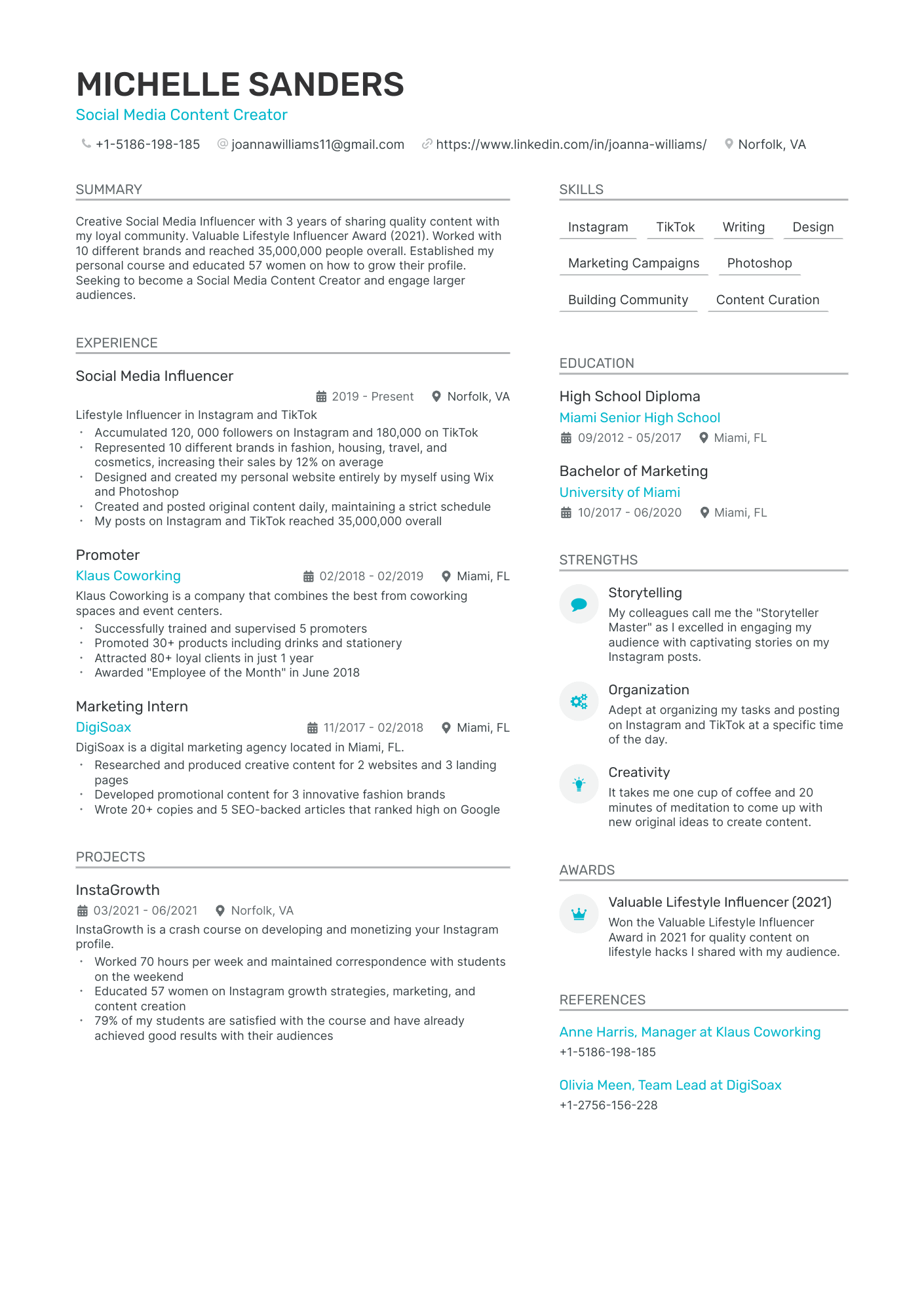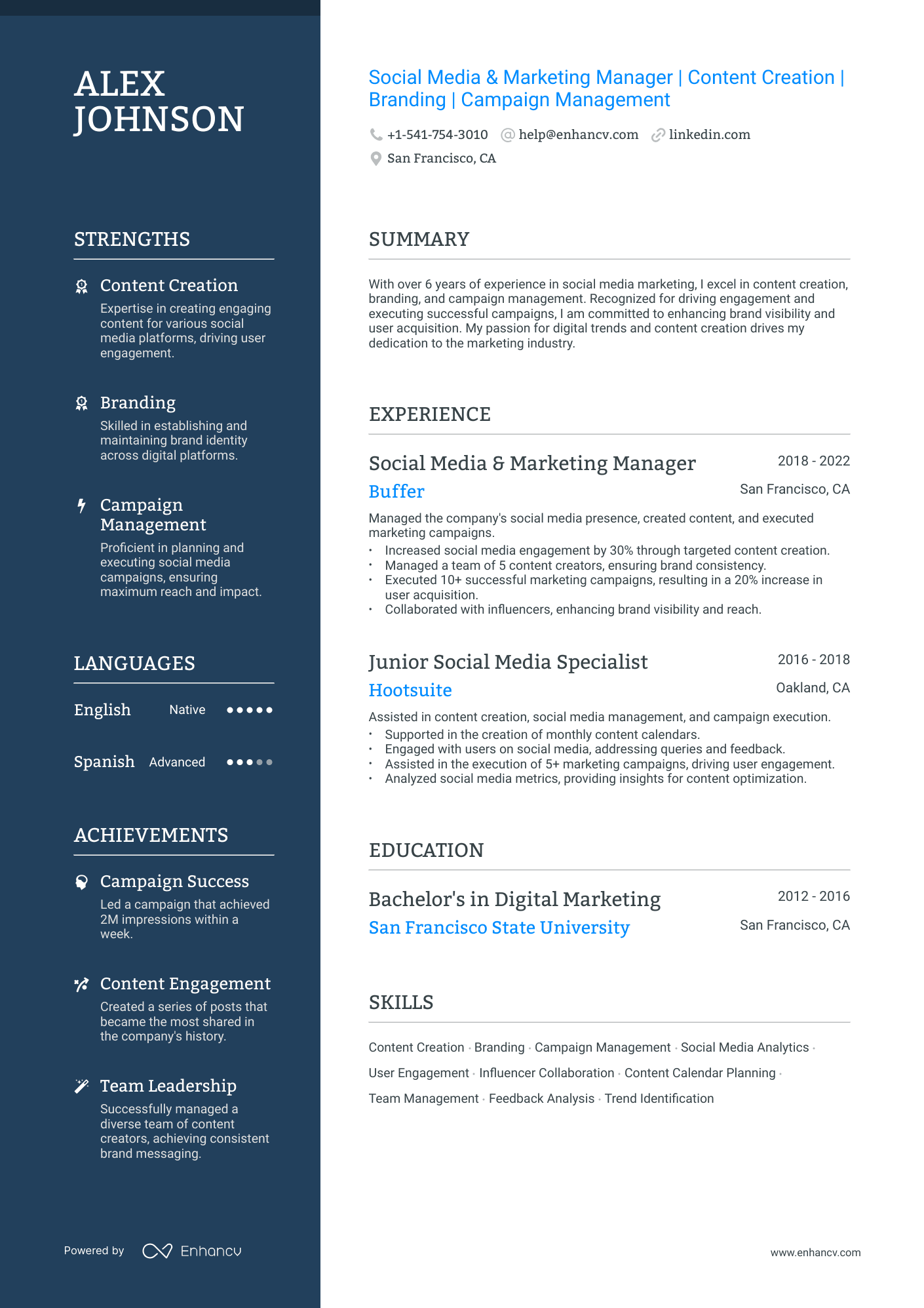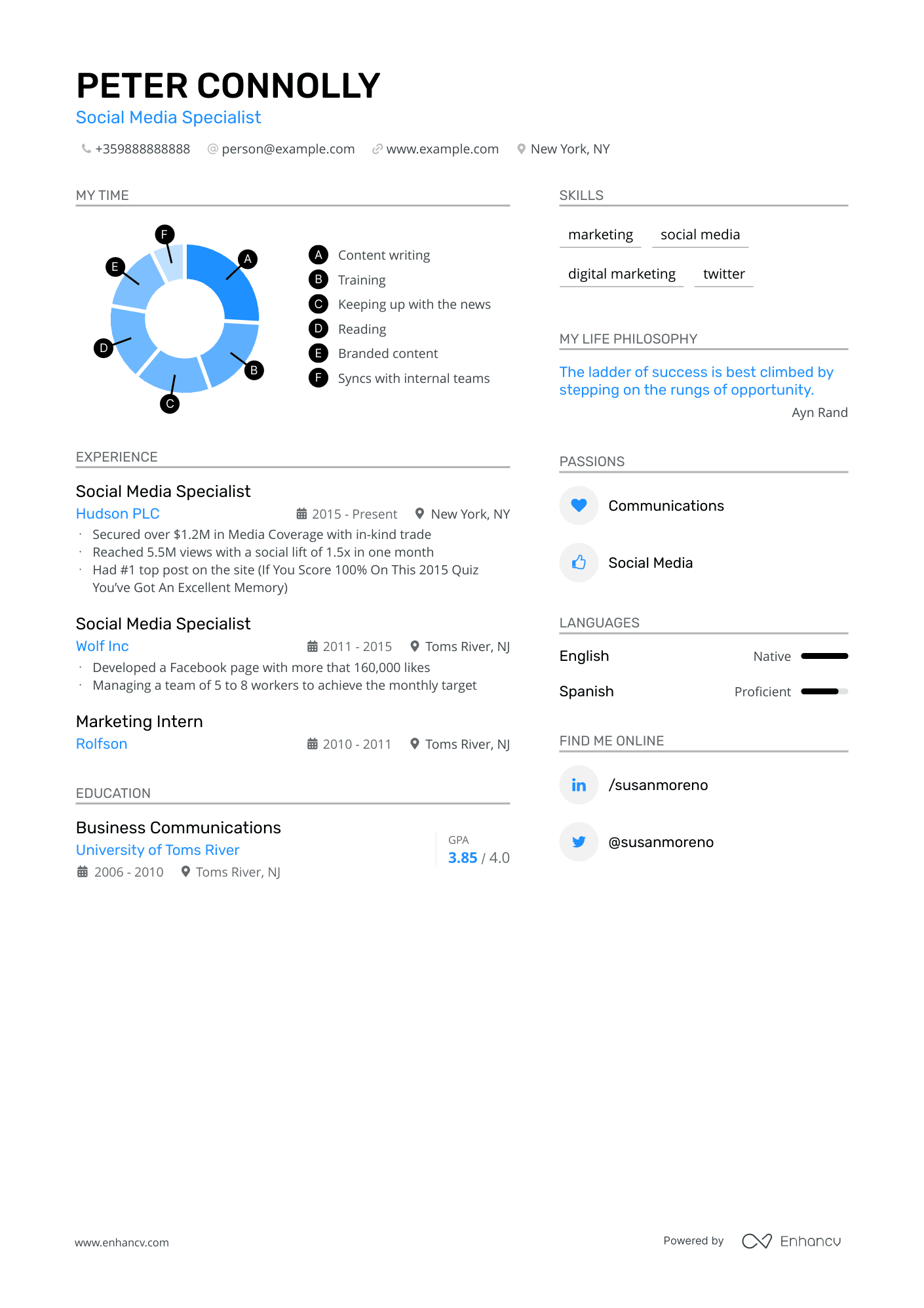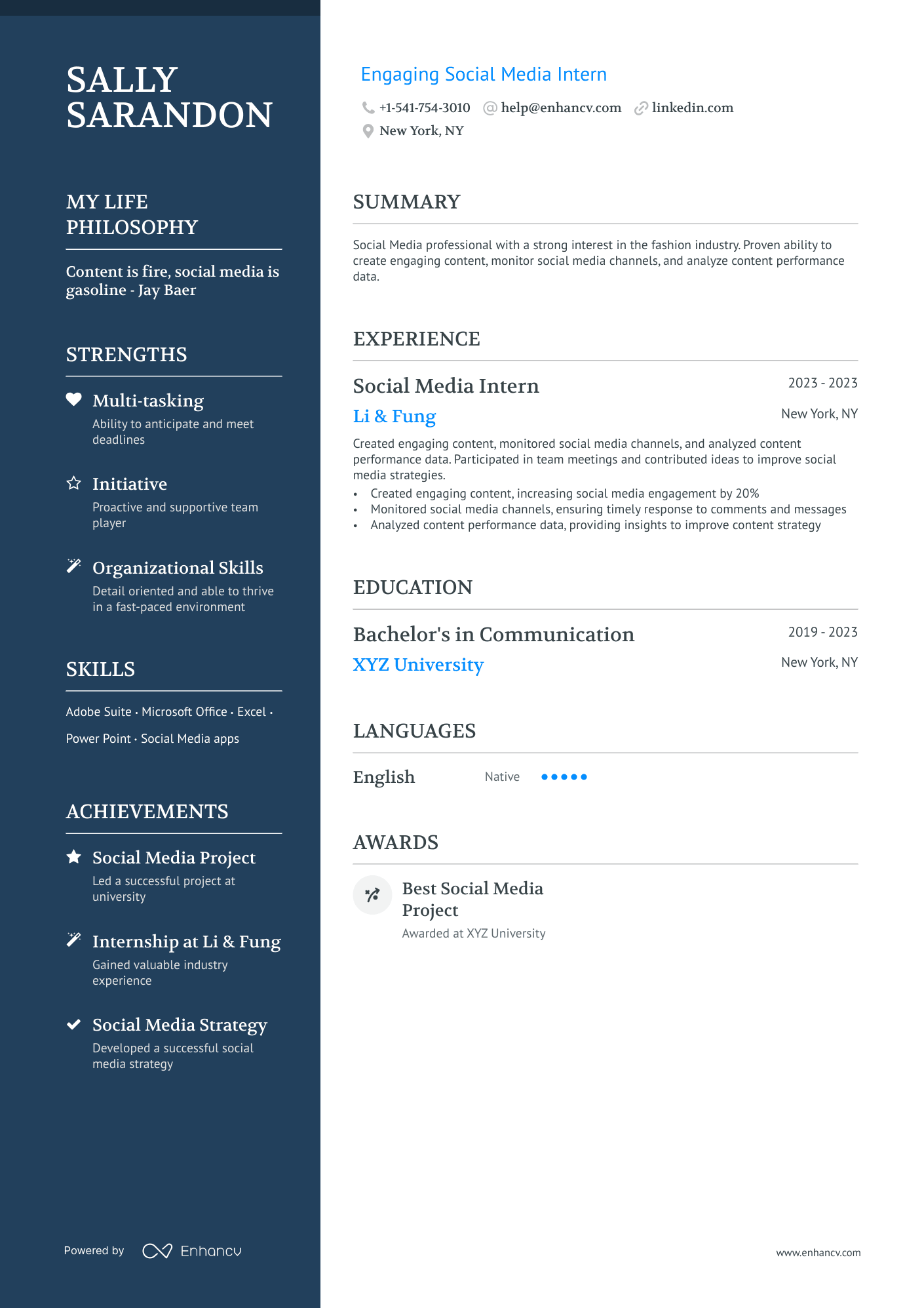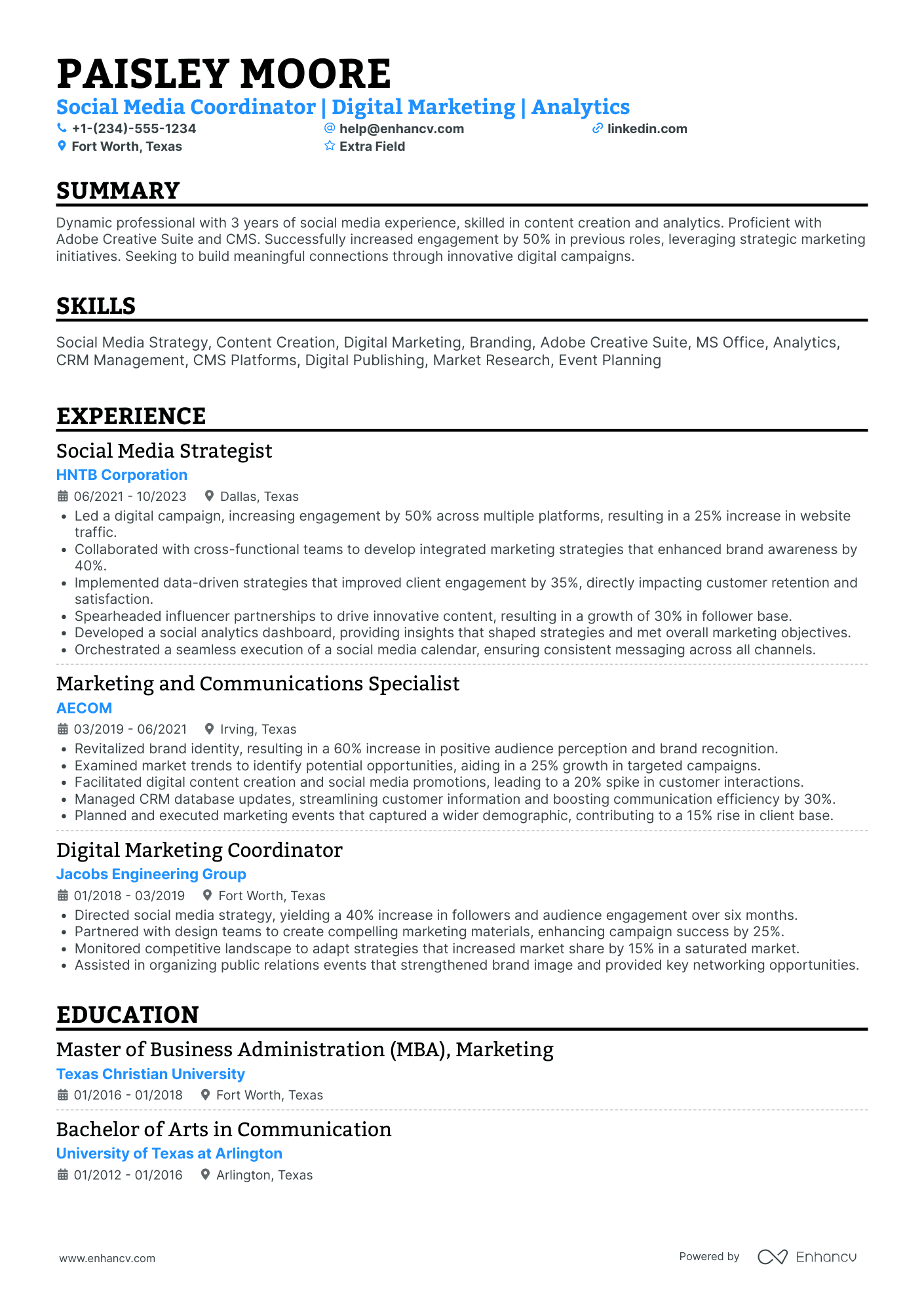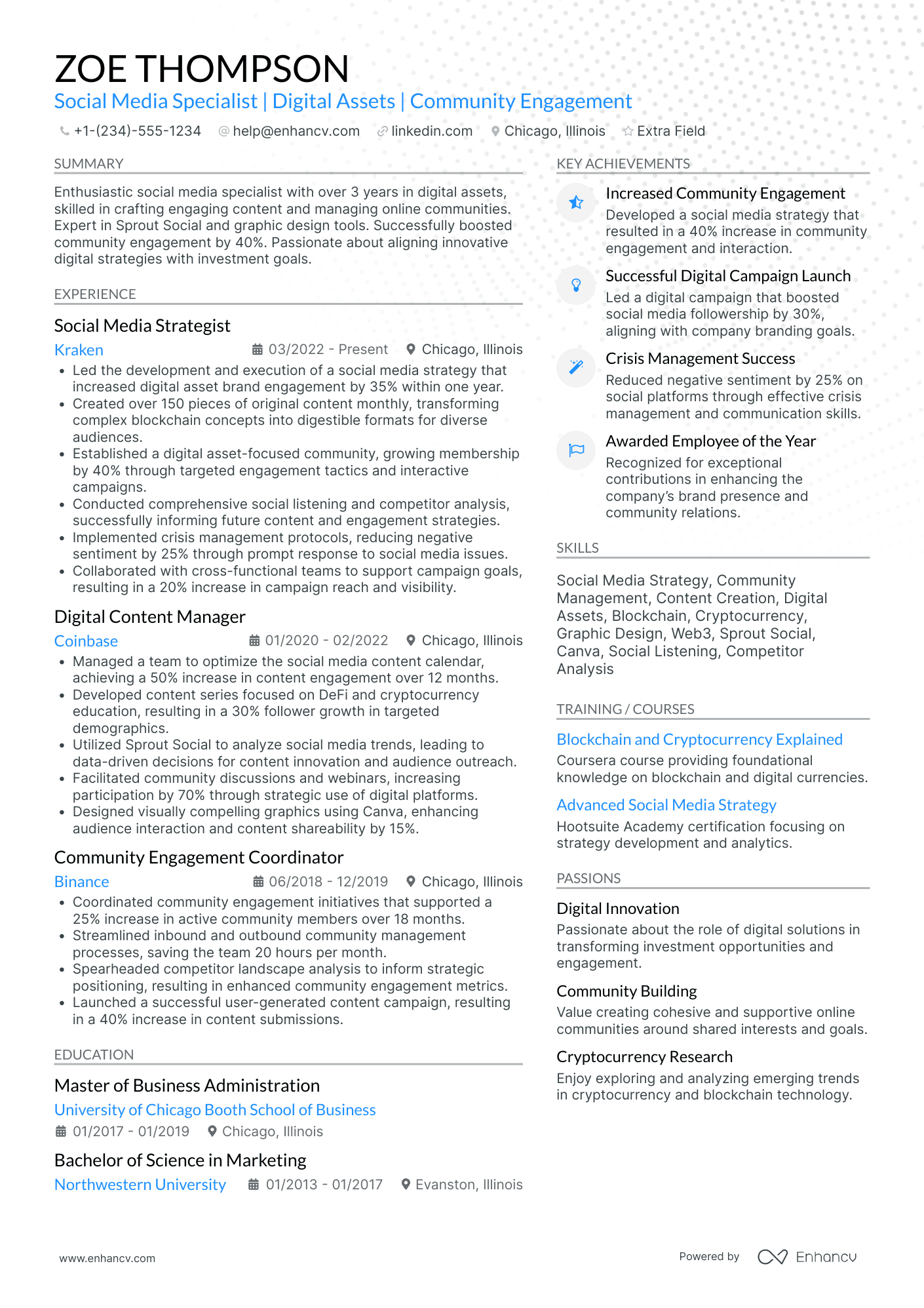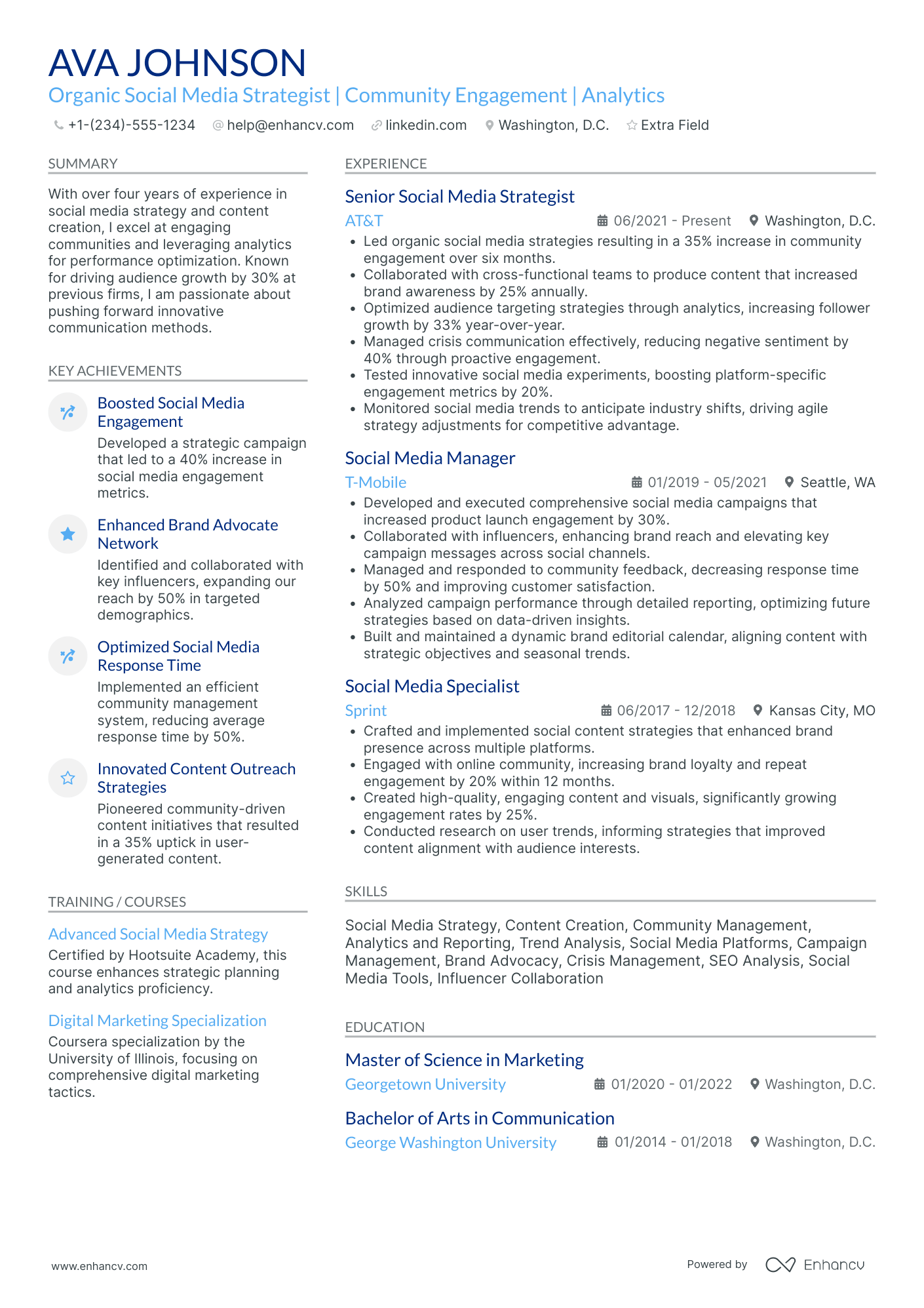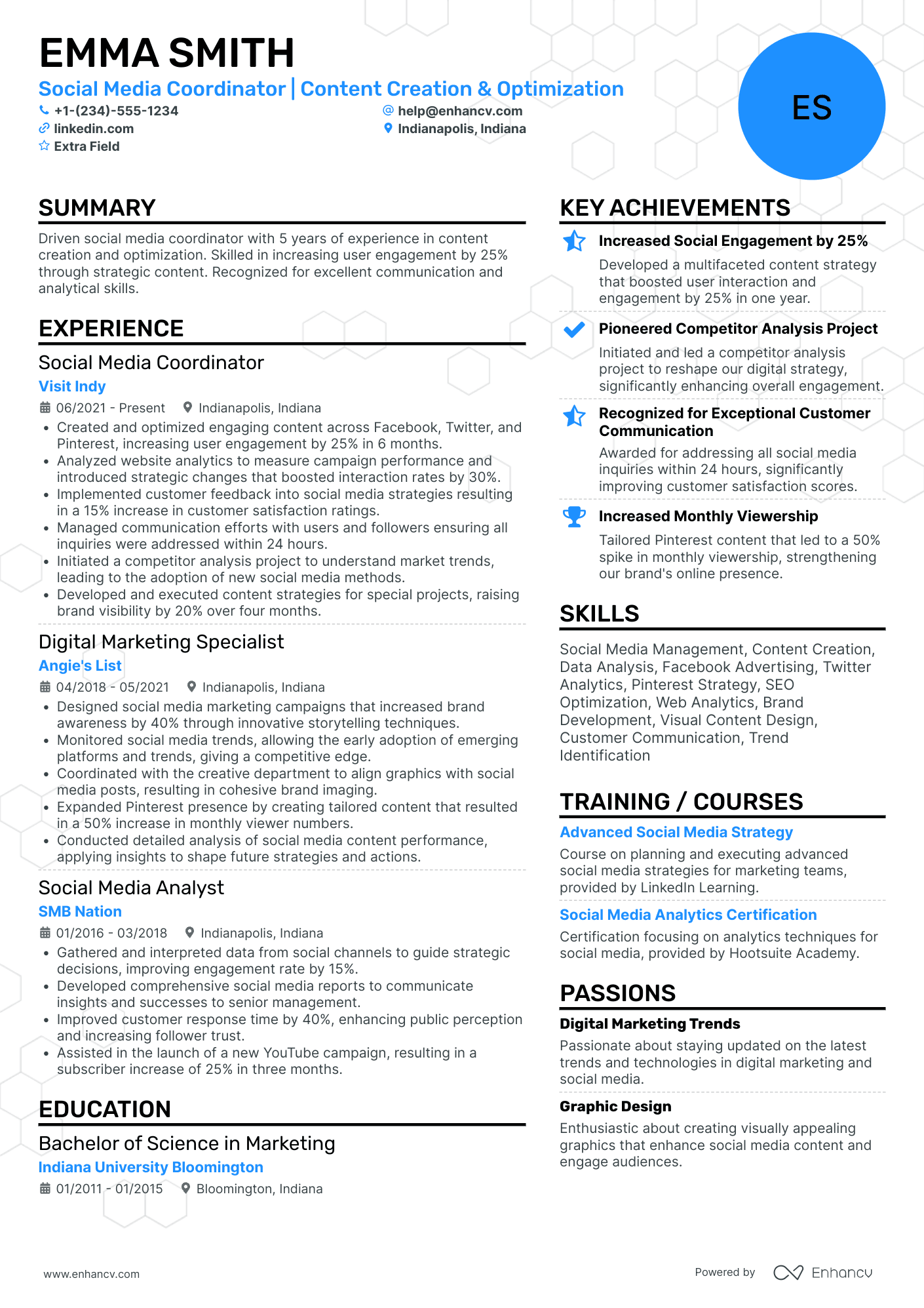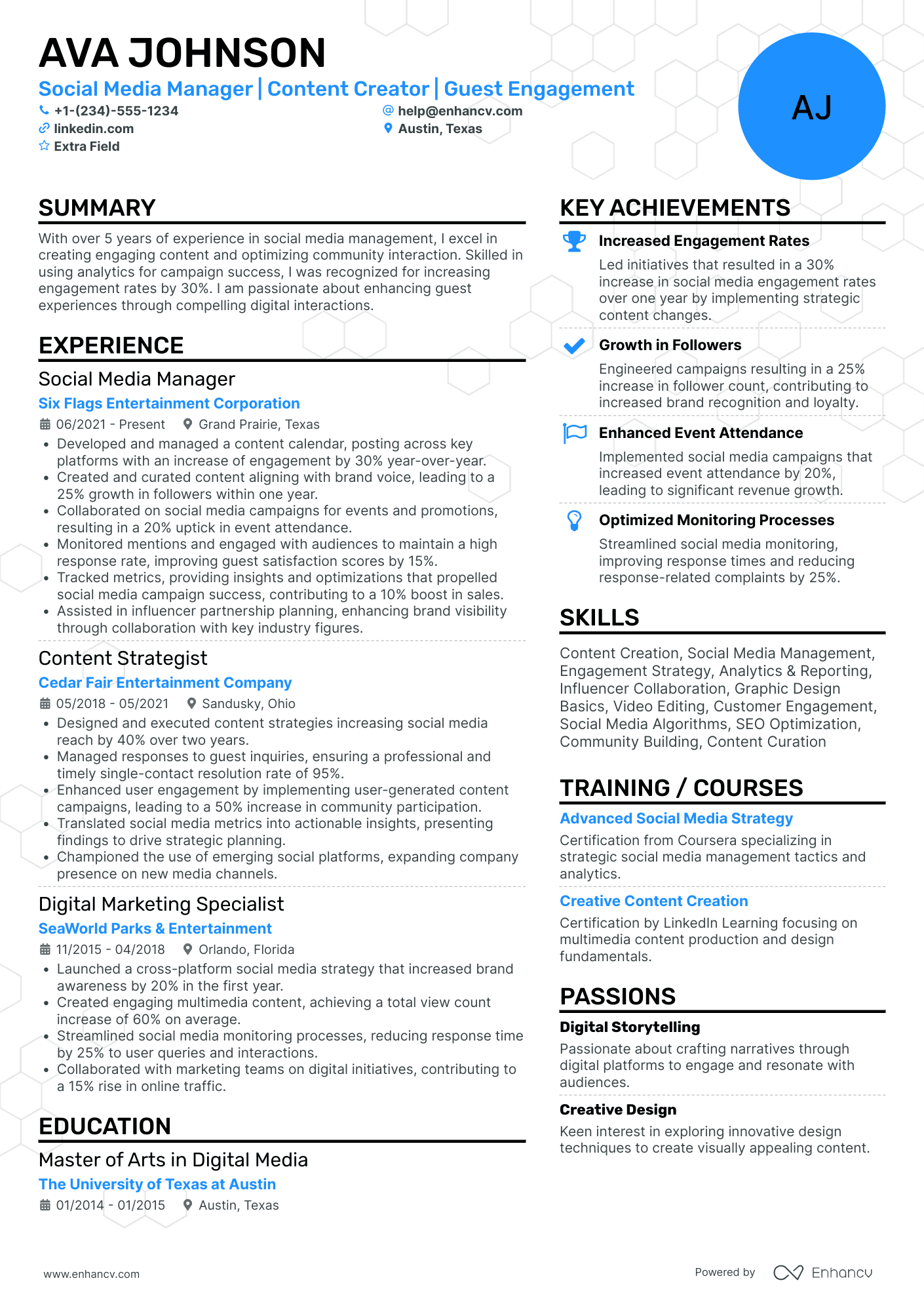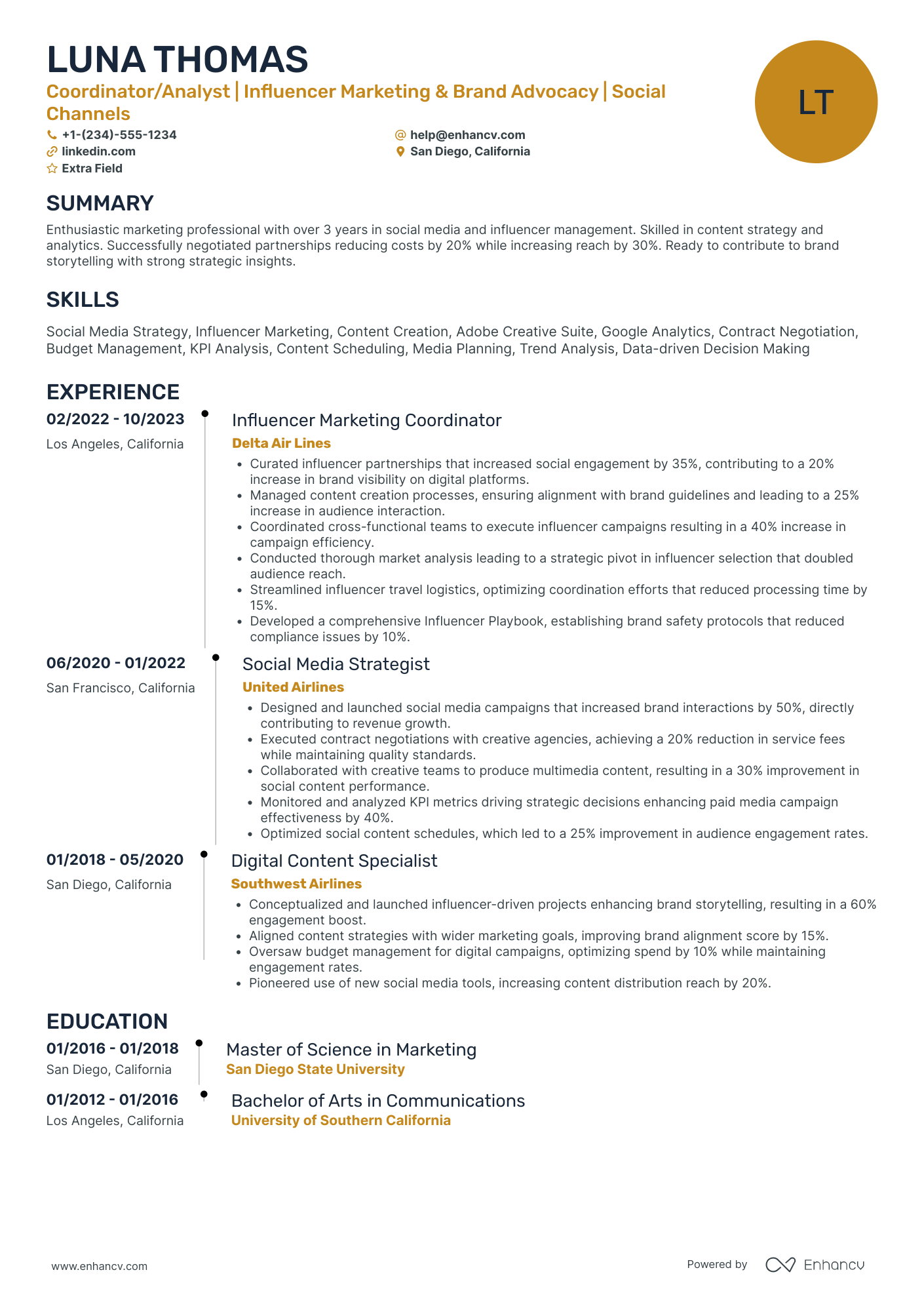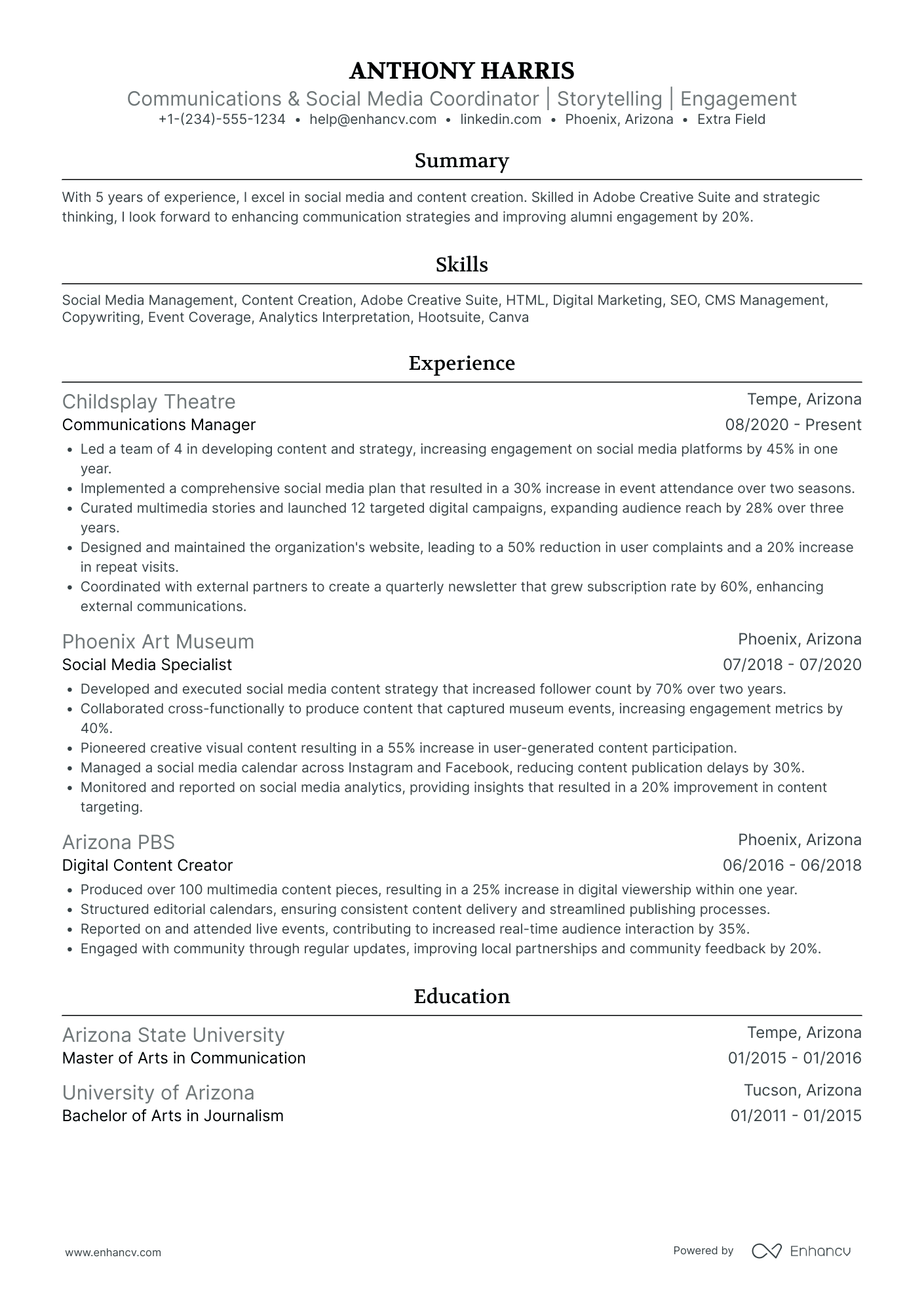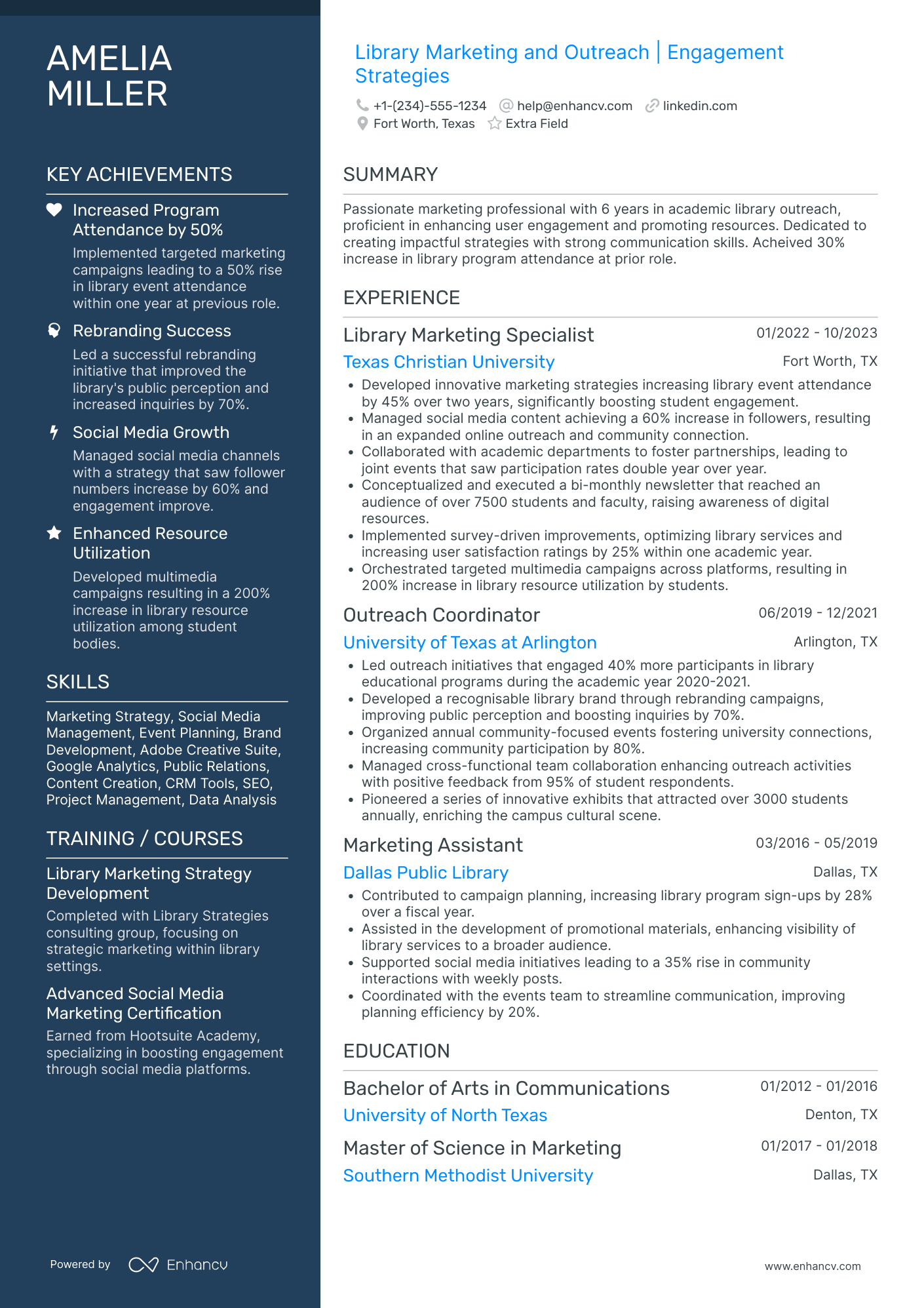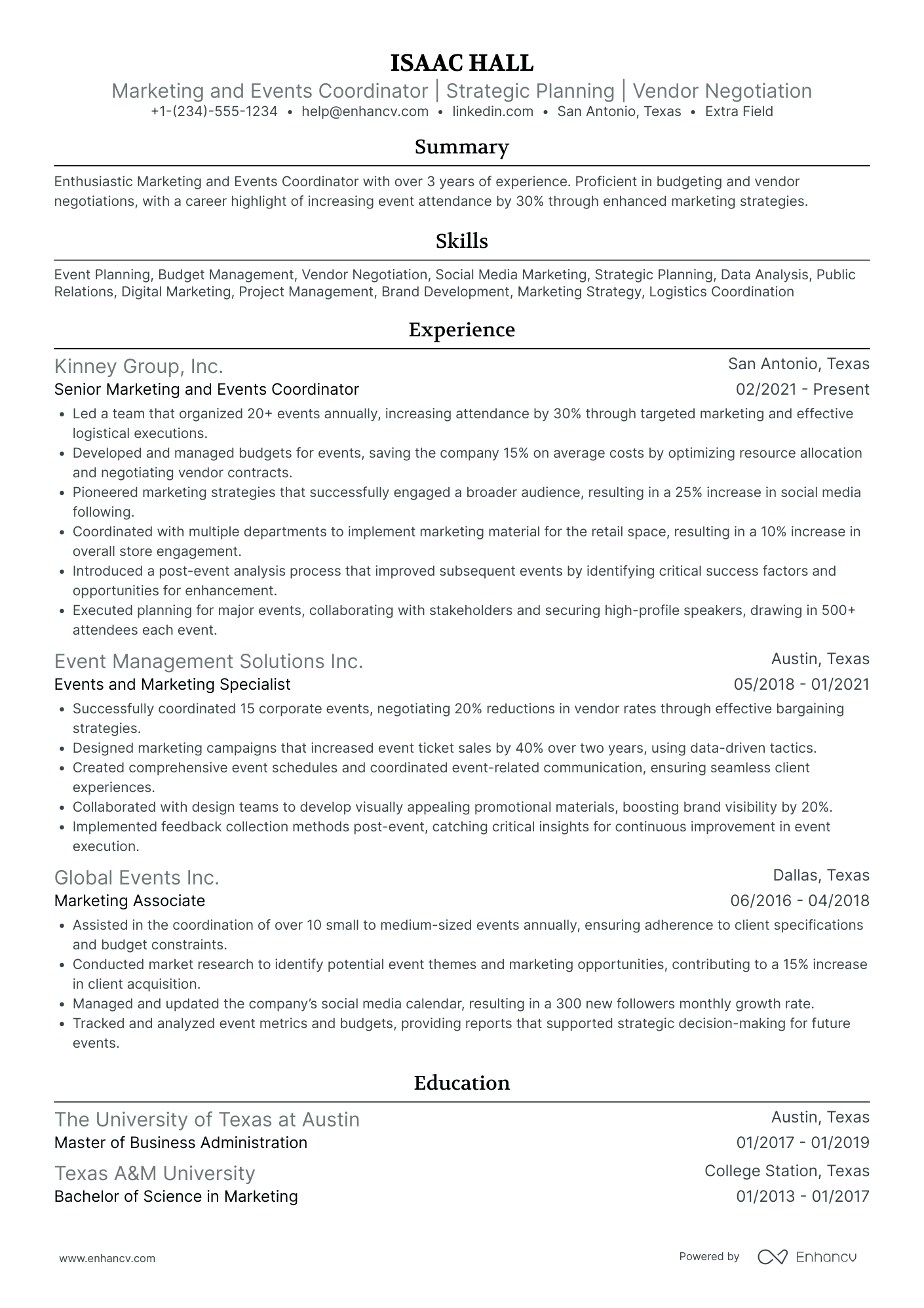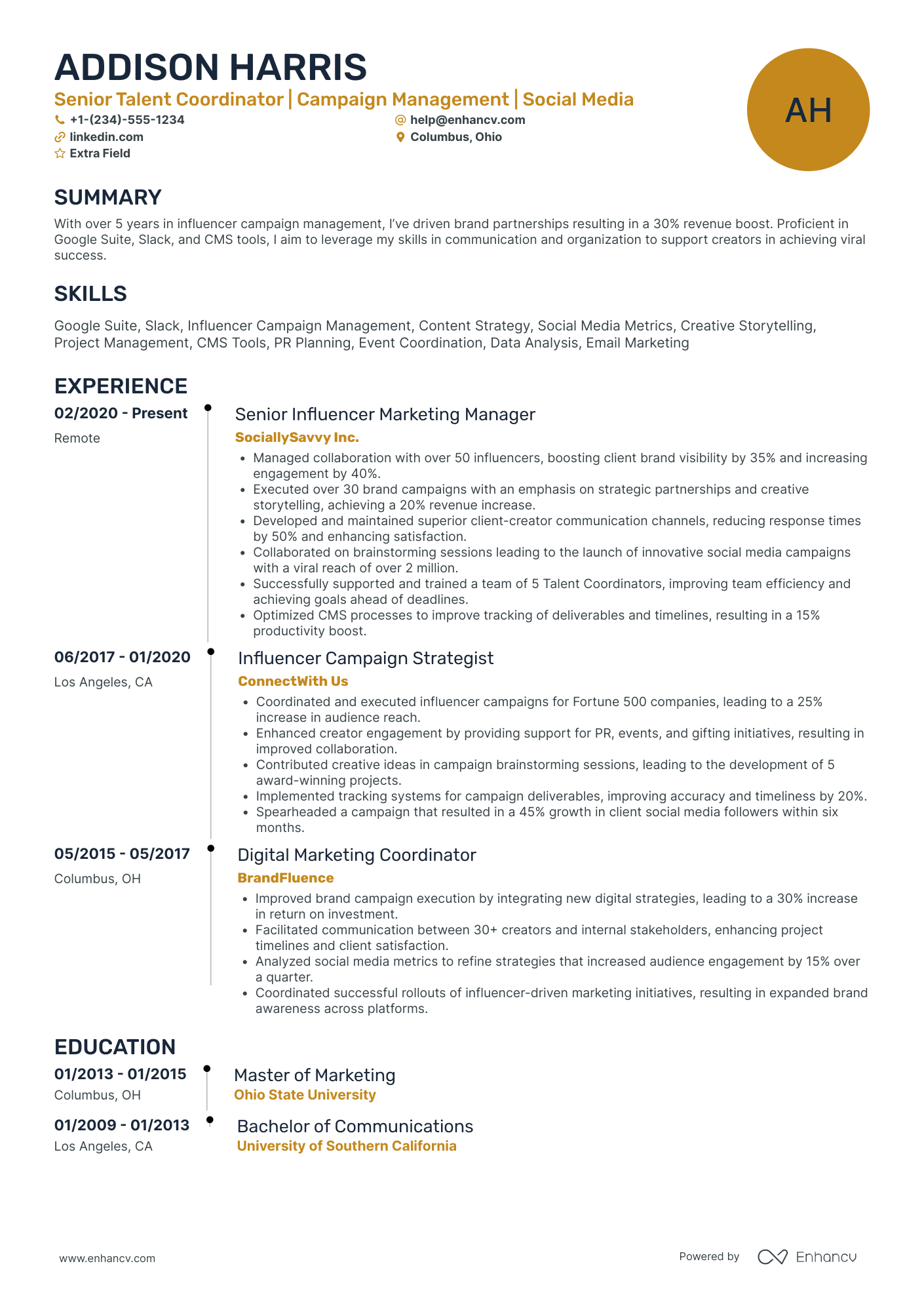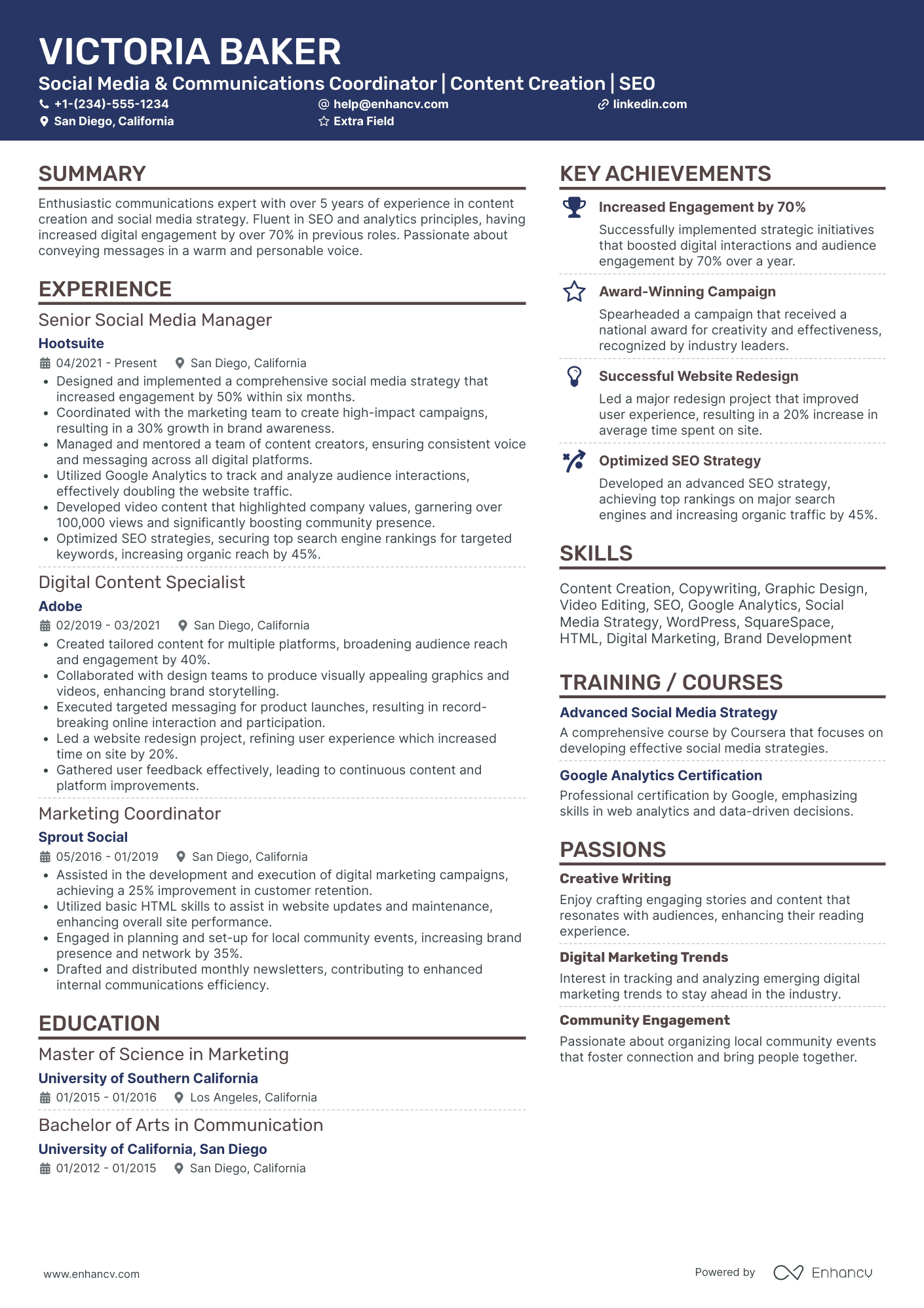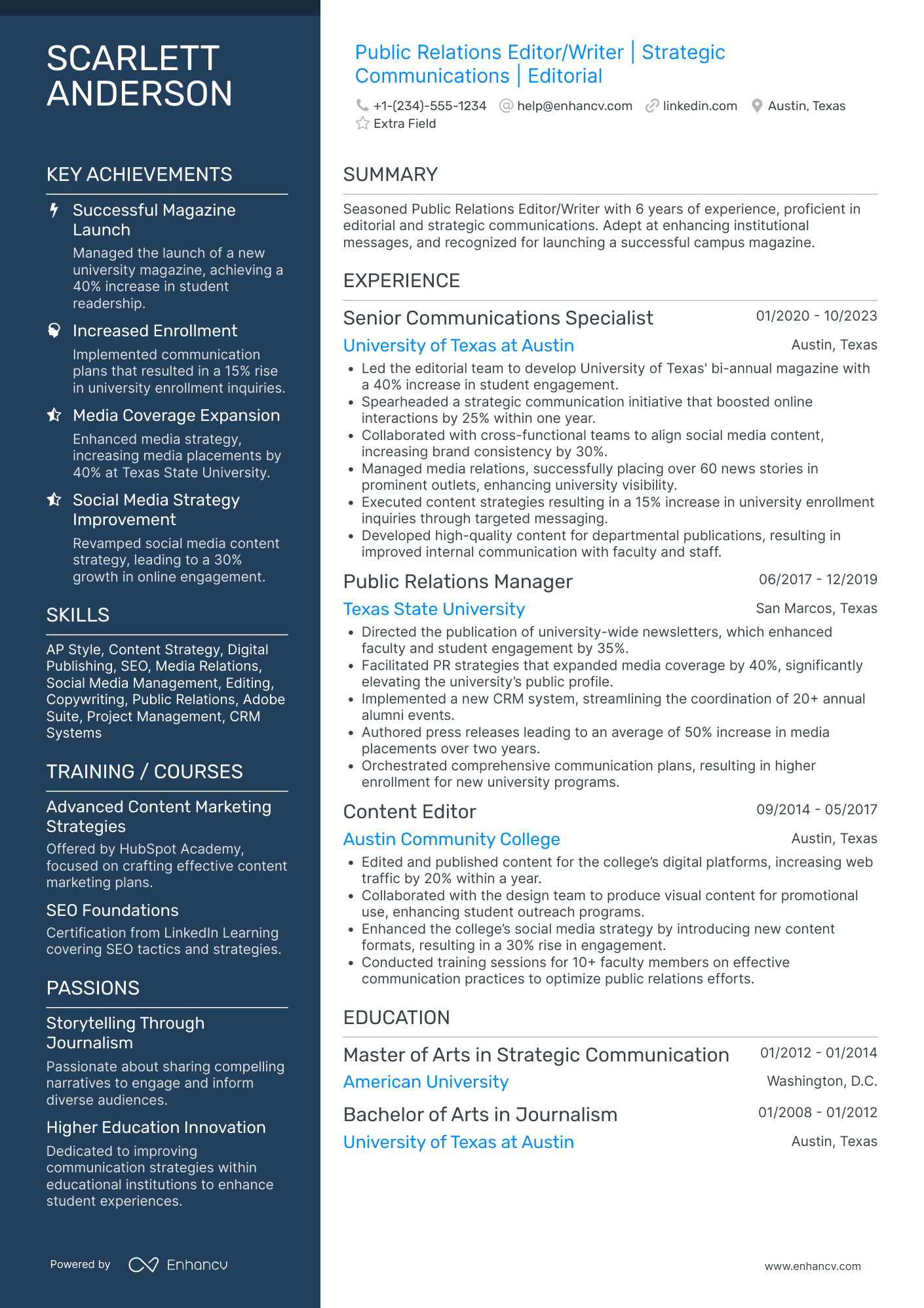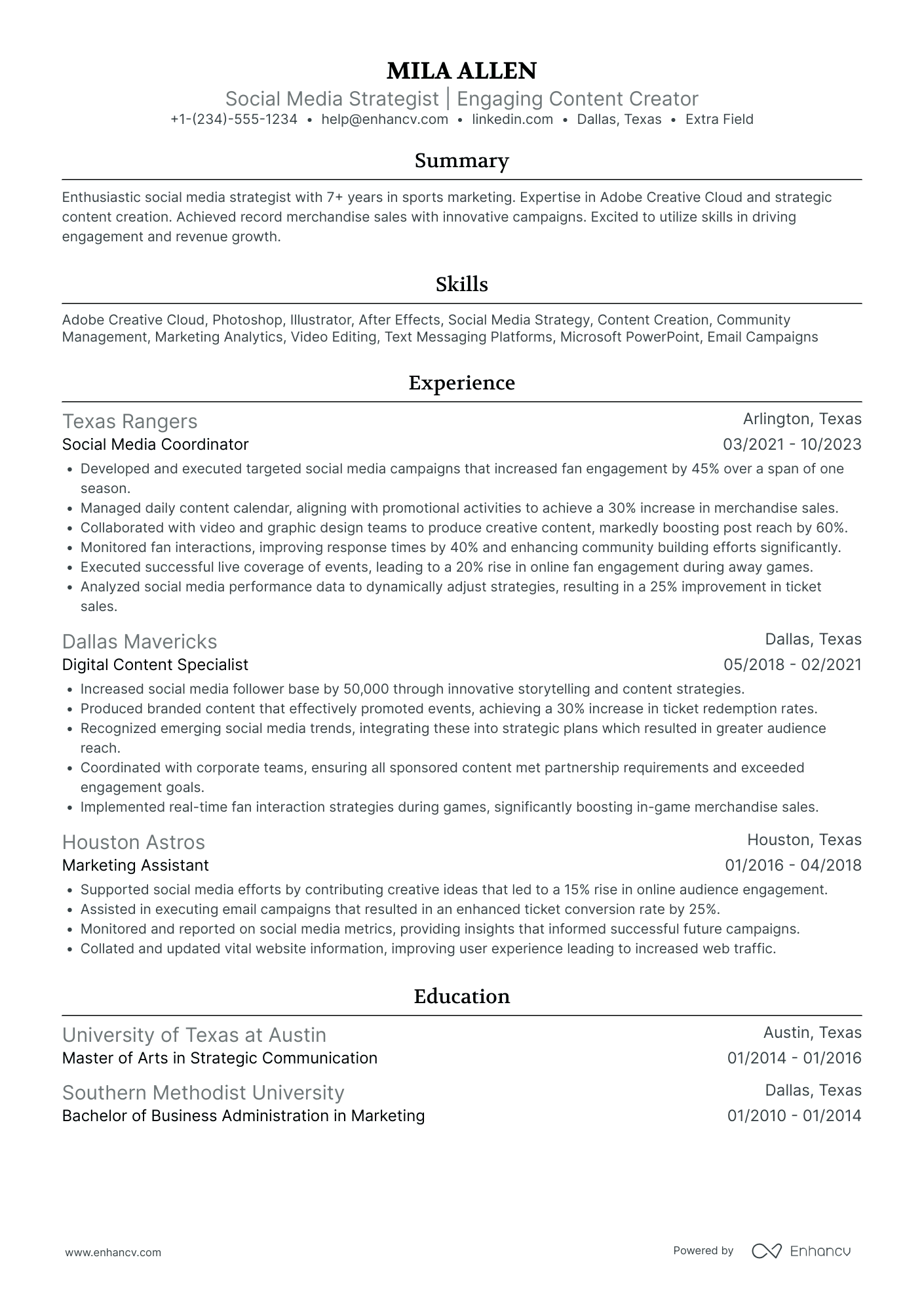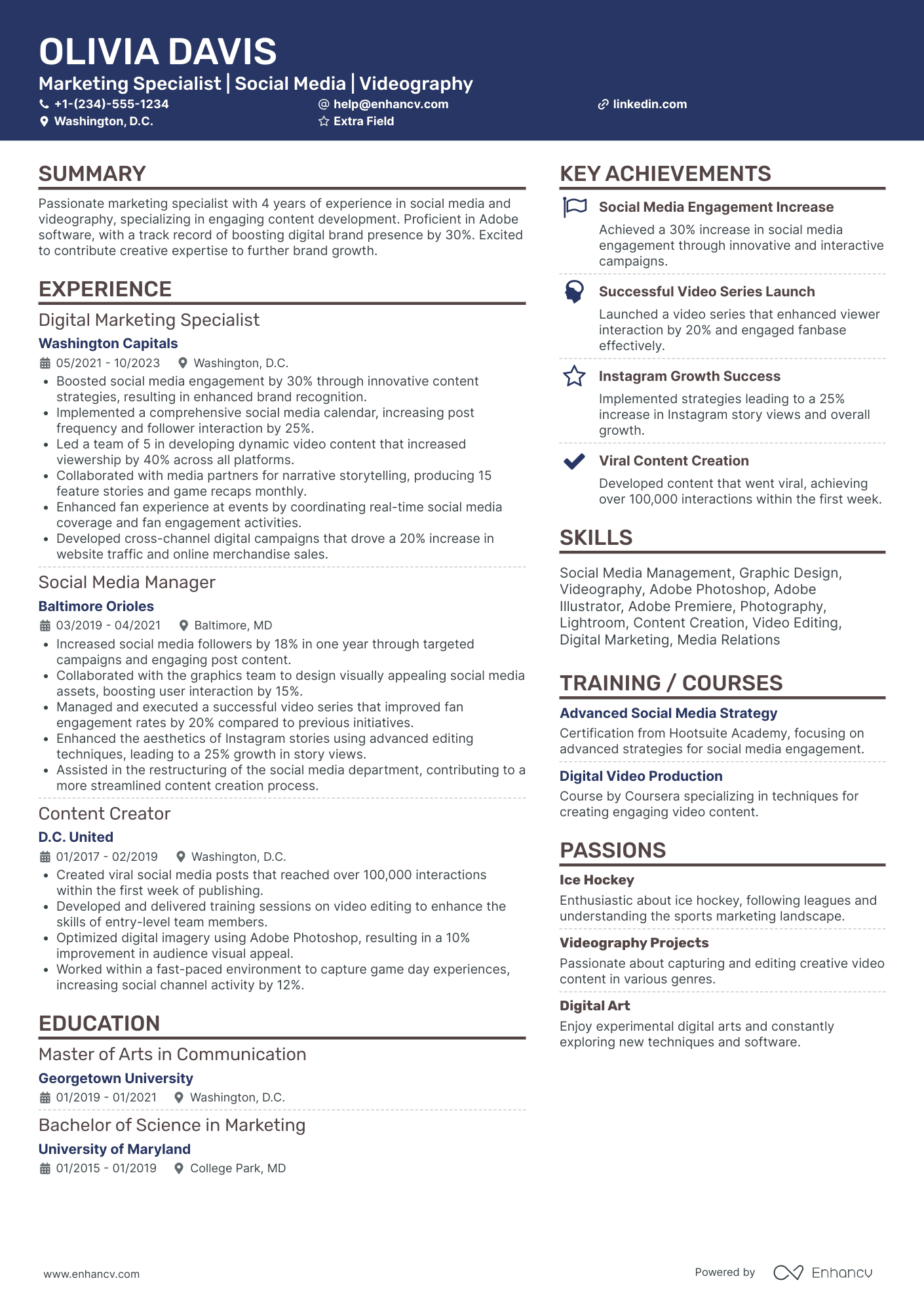In the vibrant—and oftentimes overwhelming—realm of social media, the role of a social media coordinator has emerged as a crucial stepping stone between a novice intern and a seasoned social media manager.
If you're tech-savvy and eager to enhance a company's online presence, engage customers, and promote its brand, this role could be the perfect fit. However, landing the job starts with understanding how to write a resume that showcases your ability to manage social media strategies, create engaging content, and use insights to refine tactics.
So, what makes a good resume for a social media coordinator? It’s all about highlighting the skills and accomplishments that prove your value and demonstrate your potential to drive growth.
Double-check your current resume and make sure your file is error-free with our AI-powered resume checker.
Is your resume good enough?
Drop your resume here or choose a file. PDF & DOCX only. Max 2MB file size.
Before we explore more, here’s a social media coordinator resume example that stands out from the usual template. If you want to land that interview, it’s crucial to break away from the standard structure and showcase your unique skills and achievements.
Social media coordinator resume sample
This social media coordinator resume sample demonstrates a reverse chronological format, displaying work history first to emphasize career progression. This format creates maximum impact by quickly catching the hiring manager's attention with a clear and organized presentation of relevant roles and accomplishments.
Jeffrey Biggins
Social Media Coordinator
(208) 555-1234 | jeffrey.biggins@enhancv.com | @linkedin | Boise, ID
Summary
Highly motivated and creative Marketing and Social Media Coordinator with 4 years of experience managing online presence and crafting engaging marketing campaigns. Proven track record in social media management, content creation, and performance tracking. Skilled in video production, website maintenance, and collaboration with cross-functional teams to drive brand visibility and generate leads. Passionate about creating innovative solutions to support organizational goals and align with core values.
Experience
Marketing Specialist Idaho Farm Solutions | Boise, ID
April 2020 – Present
- Developed and implemented strategic social media campaigns across Facebook and Instagram, resulting in a 35% increase in engagement over 12 months.
- Managed vendor relationships to produce high-quality promotional videos showcasing farm equipment, contributing to a 20% rise in inbound inquiries.
- Track and allocate Coop Dollars for advertising programs, ensuring compliance and optimizing budget utilization.
- Collaborate with the finance team to support monthly advertising initiatives, achieving seamless execution and measurable results.
- Design branded signage and apparel, maintaining consistent brand identity across all platforms.
Social Media Coordinator Northwest Ag Marketing | Twin Falls, ID
July 2018 – March 2020
- Created and scheduled daily social media posts, boosting follower count by 50% within one year.
- Produced and edited video content for campaigns, increasing video views by 40%.
- Maintained and updated the company website with current product information and promotions, improving customer experience.
- Supported recruitment advertising efforts by crafting compelling job postings shared across targeted platforms.
- Monitored campaign performance metrics, leveraging insights to optimize future strategies.
Education
Bachelor of Science in Marketing Boise State University | Boise, ID
Graduated: May 2018
Certifications
- HubSpot Social Media Certification | HubSpot Academy | 2021
- Google Analytics Individual Qualification (GAIQ) | 2020
- Adobe Premiere Pro Certification | 2019
Skills
- Social Media Management (Facebook, Instagram, Analytics)
- Content Creation and Video Editing (Adobe Premiere Pro, Final Cut Pro)
- Website Maintenance (WordPress, HubSpot CRM)
- Coop Dollar Management
- Branding and Graphic Design
- Performance Tracking and Reporting
- Collaboration with Vendors and Teams
Languages
- English: Native Proficiency
- Spanish: Conversational Proficiency
Use this sample to create your next resume with Enhancv’s resume builder.
You can craft an equally, if not more, impactful resume by applying effective formatting techniques. Illustrating your strengths, structuring key resume sections, and customizing your application to align with the job requirements are just a few of the approaches to consider.
How to correctly format a social media coordinator resume
The best resume format for a social media coordinator is reverse chronological, as it highlights your most recent and relevant experience first—exactly what marketing teams and hiring managers want to see. Plus, this structure makes it easy for both applicant tracking systems (ATS) and employers to quickly scan for your social media and content creation expertise.
Sticking to the following order of sections will keep your resume clean and organized:
- Contact Information
- Resume Objective or Summary
- Work Experience
- Education
- Certifications
- Skills
- Optional sections like Languages or Hobbies & Interests
We'll walk you through each section in detail, but first, check out these key resume tips to create a job-winning resume.
PRO TIP
Start-ups and more modern, flexible companies might appreciate the hybrid or combination format more, while traditional organizations might prefer the familiar reverse chronological format.
Resume design tips for social media coordinators
- Keep margins between 0.5-1 inch for a clean, easy-to-read resume layout.
- A two-column template works well for displaying your technical skills and social media achievements side-by-side.
- Use professional fonts like Arial, Rubik, or Lato, size 10-12 pt, and stick to neutral colors on your resume for a polished look.
- Aim to keep your resume to one page—concise and impactful.
Contact information
In the resume header, include your name, phone number, and professional email. Tailor your job title to match the social media coordinator role you’re applying for. If you have a LinkedIn profile showcasing your experience or a professional portfolio, add those as well. Avoid including a photo unless the job listing specifically asks for one.
File format
Name your file clearly, such as "AlexSmithSocialMediaCoordinator_Resume.pdf," so recruiters can easily find it in their inbox. Always save your resume as a PDF unless the job listing requests a different format. Double-check for details like date formatting and spelling mistakes—they can affect how ATS and hiring managers perceive your resume.
PRO TIP
Start-ups and more modern, flexible companies might appreciate the hybrid format more, while traditional organizations might prefer the familiar reverse chronological format.
Here are some additional tips while writing your resume:
- Choose a clean layout: Opt for a simple, elegant design that allows your content to shine without distracting graphics. Keep the layout professional, and readable, maintaining a resume length of no more than a page or two long.
- Customize for the job: Tailor your resume for each application based on the job description. Highlight experiences and skills that match the job's requirements using keywords.
- Use professional language: Maintain a professional tone throughout your resume. Use action verbs to describe your responsibilities and achievements.
- ATS compatibility: Applicant tracking system (ATS) software scans resumes and cover letters to weed out applicants based on factors set by the employer.
ATS often causes unnecessary fear. Contrary to popular belief, our tests showed that fonts, colors, columns, and resume length don’t affect parsing. Focus on matching job description language and formatting details like dates and special characters as those may affect your application.
However, not all companies use ATS, so avoid keyword stuffing and keep your resume clear and readable.
Your resume's job experience section should be a testament to your achievements, not just a timeline of your employment history. Make each word count, showcasing not only what you did but how you excelled.
Louise Fletcher
How to write your social media coordinator resume experience
The experience section is the core of your social media coordinator resume, where you show your ability to manage social media platforms, create engaging content, and drive online engagement. It’s your chance to prove to potential employers how your previous roles have equipped you to excel.
However, there are a few common mistakes to avoid:
- Don’t repeat the same duties for each role—highlight unique contributions and specific achievements instead.
- Avoid vague language like "helped" or "assisted." Instead, use strong action verbs and provide measurable outcomes, such as "increased follower engagement by 25%."
- Limit your experience to the past 10 years to keep your resume concise and focused.
- Only include the most relevant jobs, emphasizing roles that align closely with the social media coordinator position you’re applying for.
We’ll now show you how to target your resume to a specific job description by creating an employment history section tailored to a real-world job ad. We’ve highlighted the parts we’re targeting with the experience entry below.
Social Media Coordinator
Farm Equipment USA’s number one focus is helping the American farmer succeed by consistently providing affordable solutions and top-notch service. We are leading the industry by creating a successful team culture of high-performance leaders.
We are seeking a Marketing and Social Media Coordinator to join our team. The ideal candidate will be a highly motivated, creative, and detail-oriented individual responsible for creating and managing the online presence of Farm Equipment USA across various platforms. This role will include posting farm equipment, coordinating social media campaigns, and collaborating with both internal teams and external vendors.
Key Responsibilities:
Social Media Management
- Post and manage content across all social media platforms (primarily Facebook and Instagram) to increase brand visibility and engagement.
- Monitor and respond to customer inquiries on social media, ensuring timely and accurate responses.
- Develop and implement creative social media campaigns that align with the company's marketing objectives.
Content Creation and Video Production
- Work with vendors to create engaging video content showcasing farm equipment and related products.
- Edit and produce videos for social media, website, and advertising purposes.
- Collaborate with the marketing team to ensure consistent messaging across all platforms.
Coop Dollars Management
- Manage and track Coop Dollars for advertising programs, ensuring proper allocation and reporting.
- Collaborate with the finance team to ensure seamless use of Coop Dollars for monthly programs.
Apparel and Signage
- Oversee the design and production of Farm Equipment USA apparel, ensuring it reflects brand identity.
- Coordinate with vendors to create and distribute signage and vehicle logos.
Website Maintenance
- Work with the web team to update and maintain the Farm Equipment USA website, ensuring that all listings, promotions, and content are current.
- Ensure a seamless online experience for customers, with updated product information, pricing, and promotions.
- Advertising for Recruitment
- Manage advertising campaigns for new hires, ensuring that job postings are effectively promoted across relevant platforms.
Collaboration with Finance and Vendors
- Coordinate with the finance department on monthly program requirements.
- Liaise with external vendors to ensure smooth execution of marketing materials and campaigns.
Performance Tracking
- Monitor the effectiveness of all marketing campaigns and strategies, with a focus on increasing calls and leads coming into HubSpot.
Qualifications:
- 3-5 years of experience in dealership website management, social media marketing, and the creation of printed materials.
- Proven experience with video creation and editing (including but not limited to Adobe Premiere Pro, Final Cut Pro, or similar tools).
- Strong organizational skills with the ability to manage multiple projects at once.
- Familiarity with Facebook and Instagram advertising and analytics.
- Experience with HubSpot or similar CRM systems is a plus.
- A creative, detail-oriented approach to marketing, with the ability to generate innovative ideas to boost brand visibility and engagement.
- Strong communication skills and ability to work collaboratively with internal teams and external vendors.
- A bachelor's degree in Marketing, Communications, or a related field is preferred.
Personality Traits:
- Detail-Oriented: Ability to execute tasks accurately and with a focus on quality.
- Organized: Skilled at managing multiple projects and deadlines efficiently.
- Creative: Strong ability to think outside the box and bring fresh, innovative ideas to marketing campaigns.
- Core Value Fit: Strong alignment with Farm Equipment USA’s values and mission having integrity and a passion for helping the American farmer succeed.
Performance Metrics:
- Increase in inbound calls and leads through HubSpot.
- Growth in social media engagement and reach (likes, shares, comments, followers).
- Successful execution of marketing programs with vendors and the finance department.
- Effective management of Coop Dollars for promotions.
If you have a passion for marketing, a keen eye for detail, and enjoy working in a dynamic, fast-paced environment with a high-performance leadership team, we would love to hear from you. Apply today to be part of the Farm Equipment USA team!
Now here’s the targeted work experience section aiming to impress the above hiring manager.
- •Developed and executed creative social media campaigns on Facebook and Instagram, increasing brand engagement by 45% over two years.
- •Produced and edited video content highlighting agricultural equipment, driving a 30% increase in customer inquiries.
- •Monitor social media channels to respond to customer inquiries within 24 hours, ensuring a positive user experience.
- •Collaborate with internal teams and vendors to align messaging across social platforms, website, and advertising materials.
- •Managed a $50,000 Coop Dollars advertising budget, allocating funds effectively to boost monthly promotions.
- •Led website maintenance efforts, ensuring product listings and promotional content remained current and accessible.
- •Designed and distributed branded signage and apparel, enhancing the company’s visual identity.
- •Increased inbound calls and leads by 20% through targeted advertising campaigns and performance tracking in HubSpot.
Why this is well-written:
- Addressed social media management: Underlined campaign development, content creation, and response tracking across platforms like Facebook and Instagram.
- Met content creation requirements: Focused on video production and editing achievements with measurable impact.
- Aligned with Coop Dollars management: Demonstrated budget allocation skills and collaboration with finance teams.
- Showcased collaboration: Emphasized cross-functional teamwork with vendors and internal departments.
- Proved performance tracking abilities: Included specific metrics to demonstrate the effectiveness of marketing strategies in driving leads and engagement.
Quantifying impact on your social media resume
Being able to successfully quantify your impact on a resume is often something overlooked or not given the full attention it deserves. Take note:
- Include data on traffic growth.
- Mention the percentage increase in followers.
- Specify the increase in post-engagement.
- Highlight any decrease in the cost per click due to your strategies.
- Specify achieving high conversion rates from social media campaigns.
- Mention the amount of organic reach achieved without a budget.
- State the number of successful ad campaigns you ran.
- Discuss the level of website traffic generated or leads created from social media.
Opportunities don't happen, you create them.
Chris Grosser
How do I write a social media coordinator resume with no experience?
Creating an effective resume for a social media coordinator position without direct work experience can still be achievable by highlighting relevant skills, projects, and coursework.
Here’s what you need to know if you’re just starting out as a social media coordinator:
- Many organizations provide on-the-job training, so focus on demonstrating your enthusiasm and willingness to learn.
- Consider using a functional resume template. This format allows you to emphasize transferable skills gained from previous roles, whether from internships, part-time jobs, or your ability to create engaging content and connect with an audience.
- If you’ve taken any courses related to social media marketing, content creation, or analytics, be sure to highlight them to show your commitment to the field.
- Include volunteer work or freelance experience that involves social media management, event promotion, or community engagement.
- Write a strong resume objective to showcase your potential and passion for the role.
Objective statement for a social media coordinator resume
Your resume objective needs to highlight your passion for the industry, eagerness to learn, and commitment to driving brand growth through social media.
So, here’s how an entry-level social media coordinator should write their resume objective:
- Use no more than three concise sentences to express your motivation and eagerness to contribute to the company’s online presence.
- Mention any relevant background in marketing, content creation, or other transferable skills that align with social media responsibilities, such as creativity, communication, or analytics.
- Convey your dedication to learning and growing within the social media field, whether it’s through mastering new tools or developing innovative engagement strategies.
See how you can de-emphasize your lack of direct experience with this example objective:
Next, we’re going to discuss how to convince hiring managers you’re the right fit for the role by spotlighting your top skills.
How to list your hard and soft skills on your resume
So, now we get to the fun part. Who are you and what’s your skill set? This is an opportunity to display all of your assets and really make an impression that can ultimately land you your dream job or leave you staring at your phone waiting for a call that will never come.
The skill section of your resume is absolutely essential—even more so for anyone in a creative field or lacking work experience. So dedicate a good amount of time and energy to creating an impressive one.
Hard vs soft skills
Soft skills on a resume are personal attributes and interpersonal skills that determine how well someone can work or interact with others. Whereas, resume hard skills can be described as technical abilities and knowledge specific to a job.
Let’s check out the most sought-after skills related to social media.
Best hard skills for your social media coordinator resume
- SEO knowledge
- Data analysis
- Google Analytics
- HootSuite
- Adobe Photoshop
- Ad management tools
- Content management systems (CMS)
- Canva
- Buffer
- Social media monitoring tools
- MailChimp
- Graphic design
- Video editing
- Customer relationship management (CRM) software
- Web design
- Microsoft Office Suite
- Instagram Ads
- Newsletter services
- Sprout Social
Best soft skills for your social media coordinator resume
If your resume demonstrates your ability to manage social media platforms, engage audiences with creative content, and respond promptly to inquiries, you’re one step closer to landing your next role as a social media coordinator.
How to list certifications and education on your resume
Supporting your application with a strong education and certification section will greatly improve your chances of employment. These elements demonstrate your foundational knowledge, specialized skills, and commitment to ongoing learning in the field of social media.
Education
Formal education on a resume, such as a degree in marketing, communications, or a related field, provides a broad understanding of concepts that are crucial for creating effective social media campaigns, understanding audience behaviors, and analyzing data.
Here’s an ideal example of an education listing:
- •Summa Cum Laude
- •Relevant Courses: Social Media Marketing Strategies, Content Creation for Digital Platforms, Analytics, and SEO.
- •Capstone Project: Developed a comprehensive social media campaign for a local non-profit, resulting in a 40% increase in engagement over 3 months.
Why it’s good:
- Degree type and major: Clearly states the degree and major.
- Name of institution and location: Includes prestigious university name and location, which can be advantageous if the school has a strong reputation in the field.
- Grade Point Average: They chose to display their GPA on their resume because it’s high. There’s no reason to list it if it’s lower than 3.5.
- Graduation date: Shows recent completion of education, suggesting up-to-date knowledge of the field.
- Achievements/Honors: The mention of graduating Summa Cum Laude on your resume highlights academic excellence, suggesting dedication and capability.
- Relevant courses: Listing relevant courses demonstrates targeted education towards the career path.
- Relevant projects: The inclusion of a successful capstone project showcases practical experience and the ability to apply theoretical knowledge in real-world scenarios.
Certifications
A great way to reduce focus on irrelevant or limited education is to leverage your social media certifications. Having certifications can give you a competitive edge, particularly in competitive digital marketing environments.
See some examples of certifications that can be very beneficial for your social media resume:
Best certifications for your social media coordinator resume
Now that we’ve covered all the major sections of your resume, it’s time to focus on the one that makes you stand out to hiring managers—your professional profile as a social media coordinator.
Writing a resume summary for a social media coordinator
Your ability to communicate is key to managing social media campaigns and engaging followers—and it should shine in your resume summary.
List skills like content creation, audience engagement, and data-driven decision-making. Show recruiters you can meet brand needs and build trust with every post and campaign.
Craft a professional summary by:
- Focusing on relevant qualifications tailored to the role.
- Mentioning accomplishments, like boosting engagement rates or launching successful campaigns.
- Using two to three powerful sentences to convey your ability to drive online engagement and contribute to marketing success.
Below is a tailored social media coordinator summary example for the provided job posting.
If you have additional job-relevant details to showcase and space allows, consider including an extra section to enhance your application further.
Additional sections for a social media coordinator resume
Here are some good additional sections to consider including on your resume to make it stand out:
- Volunteer work or internships: If you’ve volunteered or completed internships, even in different fields, discuss the responsibilities you had that could translate well into social media coordination.
- Personal social media projects: If you've managed your own blog, YouTube channel, Instagram account, or any other platform with noticeable success or engagement, include these projects on your resume. Explain how you grew your audience, engaged with followers, and created content tailored to your target demographic.
- Content portfolio: Create a portfolio of your work, including any graphics, written content, or campaigns you've developed. This can be through personal projects, freelance work, or as part of your coursework. Provide links in your resume to direct potential employers to your portfolio.
- Languages: If you’re fluent in multiple languages, this can be a significant asset in managing and engaging with a diverse, global audience.
Conclusion
A well-crafted resume can set you apart as a social media coordinator by showcasing your creativity, communication skills, and measurable impact. By tailoring your resume to the job and highlighting key accomplishments, you position yourself as an invaluable asset to any team.
Take the time to perfect your application, and you’ll be one step closer to landing your next opportunity.
Social Media Coordinator resume examples
By Experience
Senior Social Media Coordinator
Junior Social Media Coordinator
By Role
